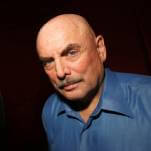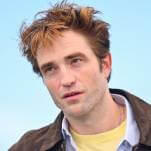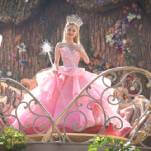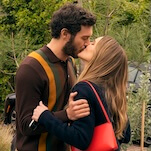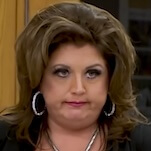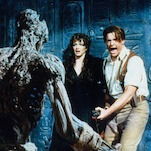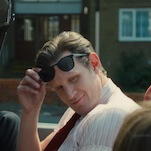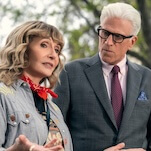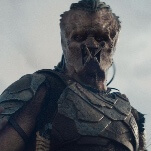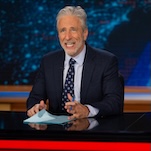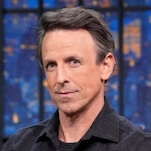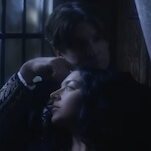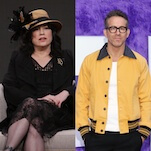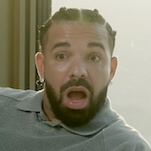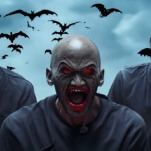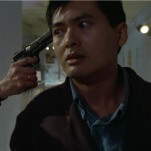Todd: “Field Trip” concludes with Jimi Hendrix’s “If 6 Was 9,” which seems entirely appropriate for an episode where everything feels upside down. Don Draper goes back to work at Sterling Cooper & Partners, but mostly because buying him out would be too big of a financial hit for the firm to absorb (and, okay, because he and Roger are the show’s one true pairing). The terms he’s given seem essentially impossible for him to keep to—but if he doesn’t, he’ll be terminated immediately, and with the firm not having to worry about buying out his partnership stake. He’s entering an environment where nothing is quite as he remembers it being, where even Peggy is peeved to see him. (Not that she lacks for an excuse—she’s in an even worse position than Don is with this new arrangement.) Meanwhile, Betty tries to be a kind and caring mother and ends up pissed off at her son, while Megan just wants her husband to really want to see her, only to realize that he’s just there to be her father figure yet again. Happy 1969, everybody.
Tellingly, “Field Trip” doesn’t really give us a way to orient ourselves in that year, however. It feels deliberately unstuck in time in ways that play nicely off of how lost everybody within the episode feels. When Roger doesn’t show at the office before Don, everybody else in the firm gets to wonder why the latter is there. The book Jim Cutler’s reading came out in 1963. And the episode is filled with characters from the show’s earliest days and nods toward some of its greatest moments. Francine has lunch with Betty. Ken mentions Don’s carousel pitch from the season one finale. A woman approaches Don at a restaurant, claiming to know him, and you almost want to believe her, so lost does the episode feel in the series’ own timeline. On a lot of shows, all of these nods would seem like fan service, like grateful thank yous to the audience for keeping this on the air as long as it’s run. On this show, they feel vaguely threatening, as if Don is going to become a creature of a past he’s run so long and so fast to escape. We don’t get a date or time period, because the episode wants us to feel as unmoored as Don does.
This makes sense, because “Field Trip” is about that very fundamental sense you get when you just want someone to love you the way they’re supposed to, only to realize that they just don’t. Don Draper was used to being the center of life in the office in a way he no longer is, while Betty Francis is supposed to be beloved by her children in a way that she never was. (It’s too late for Sally, and she’s losing Bobby. Gene will be gone to her soon enough.) Megan believes that Don is her husband, not her manager or father, only to find, cruelly, that he’s just in Los Angeles to reprimand her about how she handled an audition. And we rarely feel as lost as we do when we’re supposed to feel love but, instead, get only cold shoulders and confused expressions at our very presence.
It’s a bit surprising, then, that Roger Sterling is the one who manages to hold all of this together. He’s the guy who realizes that all Don really needs is to work, that his time in the wilderness has made him contrite enough that he might be controllable. And he’s also the guy who wins the other partners—reluctantly—over to the notion that there may be some arrangement of these pieces that could work. Of course, we know this show and these characters (okay, maybe not Lou) well enough to know that the arrangement is probably doomed to fail. But they have to try, right?
Sonia: They do have to try—legally. It’s a testament to the privilege Don has eked from the world that the entire firm he helped build wants to fire him, but can’t quite do it without bankrupting themselves.
There’s so much grace to the back half of this episode, when Don arrives at SC&P so tentatively, and waits to be seen by someone, anyone. It’s rare for this show to offer us Don Draper in a position of so little power—he’s usually recklessly empowered. Don Draper knocks back slugs of whiskey while working all night and ignoring a toothache—only to ditch work the next morning to have sex over his lunch break somewhere in Greenwich Village. That’s the Don Draper that made himself an invaluable part of Sterling Cooper, and that’s a Don that just does not exist anymore. Now he’s waiting in the creatives’ workroom, reading a magazine or two, asking Dawn for coffee and trying not to sweat right out of his suit. He’s back to being that eager fur salesman he was well before the show ever started. Except this time, he’s not a blank slate. They know about him now, and they’re judging him for it.
If Mad Men is a story of Don Draper learning how to be vulnerable, then “Field Trip” is a crucial chapter. He never climbed the corporate ladder by being himself. And Don isn’t the Don Draper he was—but he’s not the Dick Whitman he used to be, either. I think what we’re seeing in season seven is a Don/Dick hybrid—a dialectical character, built on the polar opposites of the past. I really felt for him walking back into that office. It’s the stuff of nightmares—showing up at a place and discovering that you’ve been largely forgotten. The weirdest part is how everything else looks the same; Don picks out the differences as he walks by, but mostly, the office is much as it was.
You point out Roger’s role in this episode, Todd, and I think you’re totally right—it’s so odd that Sterling would be making amends here. On the other hand, if Roger and Don don’t fix this, the world will leave them behind and keep going. Over in my Scandal reviews I have observed that characters become, at times, stand-ins for political forces or demographics. Roger and Don started out this decade at the top of the food chain. Now they’re bottom-feeders. Wealthy and comfortable, but toothless. To push my evolution metaphor much further than I intended to: They need to evolve if they’re going to survive. And you can see it starting in this episode. Don is trying on this authenticity thing, shrugging into a world of honesty and directness. Roger is trying on this “compromise” thing—and for once, even though he rolls into work drunk, he’s the only one who’s thought through the whole situation. Lost amidst our discussion of Don’s genius and ambition is that Roger has lived and breathed this company for decades without ever being really taken seriously—he inherited status, but he never proved to anyone that he knew anything. This episode suggests some lost ambition with him, and a struggle to regain it. These are two men coming to terms with the world, and their changing place in it.
Todd: Thinking along those lines, let’s think about a white guy who hasn’t gotten the respect he thinks he deserves. Yes, it’s time for our first big Harry Crane storyline of the season, which means that we get a lot of scenes where Harry is right about something—in this case needing a computer to compile data for the company—but so obnoxiously so that nobody really wants to listen. Hell, Cutler realizes the truth of what he’s saying but still marks Harry as the most dishonest man he’s ever met. I wonder what it says that Mad Men so often puts into the mouths of Harry and Pete—its most irritating characters—ideas that would eventually become accurate ones. Harry finds himself stuck in a position where nobody knows that SC&P even has a media department, but when Cutler tries to help him resolve the situation by having someone at the Wall Street Journal call him, Harry’s lies come further to light. It’s kind of a goofy subplot, but Harry’s always been a character who knows his place in the food chain but feels that place is far too low for someone of his stature. He thinks too much of himself, where Don is willing to bow and scrape as low as possible to get back to where he wants to be. That makes the two men mirrors, and it makes the offhand mention of “The Wheel” (another episode where the two are mirrors) all the more meaningful.
I love the way you refer to those scenes where Don feels so out of place within the SC&P offices. It even looks to me as if his suit doesn’t fit quite right, and director Christopher Manley keeps placing him at odd positions in the frame. For example, in that shot where Lou pops into the office to tell everybody to come to his office, everyone’s focus is on Don, but because Lou is standing up, he’s the guy we naturally perceive to have all the power. Which he does! But the combination of elements makes him seem at once powerful and powerless. It’s a nifty trick, and it makes me think about how one of the major themes of this season is parents and children. Here, we have Don returning to the offices with the distinct sense of the kids all running in excitement to proclaim, “Daddy’s home!” And yet there’s no real place for him within the office’s cosmology anymore, an uncomfortable reality that the other partners have to confront when he wants his job back. Things have moved on, but the dinosaur wants back in and seems willing to become a bird to do so. Similarly, Megan wants Don to stop dealing with her like he might deal with a daughter. She’s his wife, right? And yet the way the two’s relationship began means that he’ll always have this paternalistic casual dominance over her, even as the continental separation between the two of them has only increased her sense of independence.
The reason Don might feel this paternalism toward her is because of the other woman he’s been married to, who makes her first appearance this season tonight and gets the episode’s major subplot. I touched on Betty very briefly above, but it’s worth looking more at how the character does everything right and still precipitously fails. “I wish it was yesterday,” Bobby says after his day at the farm with his mom, and he seems to speak for just about everybody in the episode. Betty and Bobby bond. They ride on the bus together. She tastes cow’s milk gamely, like a good parent. And yet when the moment comes and Bobby trades away her sandwich (to some poor girl who doesn’t even have one!), she can’t stop from letting her bitterness overtake her.
What’s so interesting to me about Mad Men is the way that all of these characters can change so much, but they can’t change entirely. Betty has always been marked by this growing bitter sense at her core, one that only got worse because of her first husband. And as much as her relationship with Henry has helped her put some of that to rest, it’s always waiting, right there to come back at a moment’s notice. Betty’s right to be angry, but she’s also supposed to be bigger than that when it comes to her son, when it’s the one black mark on an otherwise perfect day.
Sonia: That actually brings me to realize something rather interesting: In almost every crucial scene in this episode, Don is seated. He’s seated at the meeting with the partners; and he’s seated in that moment with Lou at SD&P. I think he’s even reclining when he tells Megan he was fired. What I noticed most of all, though, is that he’s seated when he meets Peggy again. Because even though she’s pretty short, she’s looking down at him while speaking. There’s some clear communication happening in the blocking.
Peggy struck me as almost implausibly bitter in this episode—though I’m beginning to realize that maybe there is no actual depth of bitterness for her, stuck as she is in such a thankless job. I really thought she’d be happy to see Don back—he was her mentor for so many years! But instead she’s angry. (Not even indifferent; angry.) I don’t quite know what to make of it. Partly, she seems miffed that Don didn’t come to her immediately. Partly, her ambition is ruffled by his reappearance. But partly, I think she’s also annoyed at how much she needs Don to be good at her job. She’s great, but she’s a satellite to his genius. Now he’s going to swoop in and be Don, and it will be super annoying, because despite all of his other issues, he’s a great ad man.
Betty’s bitterness parallels hers—and it’s about Don, too. Betty’s raising all of his kids without him. And she hates it so much she can’t even admit that she hates it. She blames Bobby for no longer loving her—when she, obviously, is the one who can’t let herself love him more (or be more compassionate towards him, anyway). Her entire shtick on the field trip to the farm is hilariously out-of-place with the rustic sensibilities of the country: She’s smoking, wearing shades, adjusting her pearls. When she reaches over to grab the milk bucket, her handbag is dangling from one of her arms. And the only time she smiles, in the whole episode, is when she and the other mom have a bitchy moment about how the teacher isn’t wearing a bra.
Betty and Peggy are bitter because they’re stuck in a kind of infantile power struggle with Don. He’s always been the one who paternalistically called the shots in their relationships. It made more sense with Peggy, because he was her boss. But with Betty—and Megan, as you point out—the father-figure is a convenient and vacant role. You might argue that Don is clearly working through a dynamic with his mother through the women in his life, with Sally as the natural endpoint. Look at his sudden rage when Dawn can’t pay attention to his beck and call over the phone. Or his self-righteous anger when he tells Megan that her agent summoned him to L.A. It’s a type of tantrum he’s throwing. And I do like, too, that Don’s trip to L.A. is his own little field trip out West. Also, it’s interesting that though we get an interior shot of the plane on Don’s trip to L.A., we don’t see it for the way back. It made me think that it’s possible the field trip just never ends. “I wish it were yesterday,” indeed.
But even though I do think Don’s relationship with Sally is the show’s most important endgame, focusing this episode at least in part on Bobby Draper and his relationship with his mother offers a glimpse of the other side of that dynamic. Bobby clearly worships her—he’s dazzled when she says she’ll come, and she’s glamorous and pretty in a way that even the other kids seem to appreciate. And it did not escape me that Bobby thought Betty wasn’t going to eat anything—because remember when she didn’t eat anything at all? Bobby remembers. (And probably got scolded for assuming she would eat, back then.) It’s not love that Betty wants from her children, even though she thinks that’s what she’s missing. She’s got love. It’s she that is really lacking, here. She’s not capable of loving her kids. She’s not capable of loving Henry. She’s not capable of loving anything—just possessing, smothering, and punishing. She’s too much of a little girl herself to do more than that.
Everyone is so unhappy in this episode. Bitterness and resentment and guilt abound. Characters who might represent optimism and ambition are deliberately sidelined—it’s no surprise that we haven’t seen Bob Benson yet this season, and even our Californians sit this episode out. Joan’s curt resignation at Don’s presence is about the happiest anyone gets at SC&P. By comparison, Ken Cosgrove’s enthusiasm over seeing Don and his new baby is like a penny dropped in an empty room—a discordant bright note that doesn’t quite belong there.
Todd: Those discordant bright notes also might be why this episode plays so well in so many instances as a kind of cringe comedy. The characters know that their places have shifted, but they’re waiting for the music to end, so they can all sit down and realize who no longer has a seat. It’s telling the way that everybody just shifts immediately to Don, and the partners—and Lou and Peggy—must know that having him around will surely flip everything that had been made a nine and turn it back into a six. Don’s brilliant, and nobody wants his genius at some other shop, but they’re also hesitant to ruin the good thing they’ve got going. Who needs brilliance when you could have somebody who’s adequate? And who needs the unpredictable when you’re just trying to maintain?
Todd’s grade: B+
Sonia’s grade: A-
Stray observations:
- David James Elliott appears again as the man trying to hire Don away from Sterling Cooper & Partners. I only just recognized him now, which is a shame. You know you’re getting somewhere when JAG himself drops by! [TV]
- It’s almost Girls-like, Don and Megan’s post-sex L.A. breakup. [SS]
- Ken and Cynthia Cosgrove are pleased to announce the arrival of their beautiful son, Edward “Eddie” Cosgrove. With a name like that, he’ll surely become an important figure in the George W. Bush administration. [TV]
- Todd’s wife’s fashion corner, in which Todd’s wife says things about the fashion on the show, and Todd transcribes them: “Livin’ for Joan’s dress!” [TV]
- Stan offers his hand to Peggy so she may stand up, and a world of ‘shippers sinks to their knees. Just kiss already, goddammit! [SS]
- The eternal wonders of Michael Ginsberg: He refers to the Playtex campaign he inherited from Peggy with the universal symbol for “honka honka.” [TV]
- Also, he pulls out a very subtle turn of phrase that speaks to both his Jewish heritage and his gossipy, affectionate nature: “You want I should ask him?” [SS]
- Question for the peanut gallery: By Lane’s old office, do we mean Peggy’s current one? [TV]
- It speaks to my very male brain that it took me forever to realize that Joan’s hesitancy about her boots was because it would take a long time to remove them before entering Bert’s office. I am too used to men’s shoes, apparently. [TV]
- “They make butter. And grow eggs!” [SS]
- Next week on Mad Men: Just lots and lots of applause. [TV] And, literally, Peggy lifting up her head and saying, “What?” [SS]

